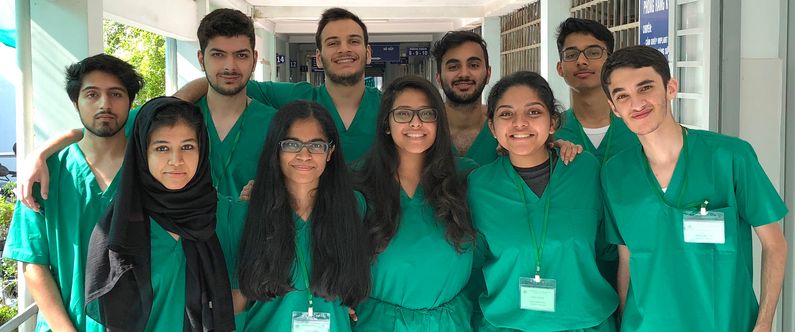WCM-Q students explore global health issues in Vietnam
 Ten WCM-Q pre-med students spent 12 days in Vietnam on a global health service learning trip.
Ten WCM-Q pre-med students spent 12 days in Vietnam on a global health service learning trip.
Weill Cornell Medicine-Qatar (WCM-Q) students gained an international perspective of healthcare when they visited Vietnam as part of a Global Health Service Learning Program (GHSLP).
Ten first-year pre-medical students from WCM-Q spent 12 days in Ho Chi Minh City, where they volunteered at the Orthopedic and Rehabilitation Hospital, worked with special needs children in a daycare center, learned about treatment modalities commonly used in Vietnamese healthcare, and observed basic health checks, patient care and hospital duties conducted by the healthcare teams in their designated areas.
The students also spent time learning about Vietnamese culture and history, as well as reflecting on what it means to be a global citizen and a healthcare professional in a world in which resources are unevenly distributed, leaving many people without access to high-quality healthcare.
The program, which offers a unique global health learning opportunity, is directed by Dr. Rachid Bendriss, assistant dean, student recruitment, outreach, and foundation programs and Dr. Sohaila Cheema, director of WCM-Q’s Institute of Population Health (IPH), which organized the GHSLP.
Dr. Cheema said: “Visiting Vietnam was a powerful and enriching experiential learning opportunity for the students. They got to experience the unique Vietnamese culture and to discover how that culture affects the way healthcare is delivered. Additionally, the program allows the students to develop a sense of civic engagement and a global perspective.”
In the Orthopedic and Rehabilitation Hospital, the students observed basic healthcare duties like taking blood pressure measurements, mixing medicines and removing acupuncture needles, all under the supervision of trained professionals. They also observed physicians cleaning and dressing wounds, repairing fractured bones and damaged nerves in the operating theater, and using massage and other physiotherapy techniques to relieve pain and increase range of motion in patients’ joints. In the daycare center, they worked closely with children with cerebral palsy, Down’s syndrome and ADHD, helping out at mealtimes and keeping the children entertained with games and songs.
In addition, the students learned about some of the healthcare challenges facing Vietnam, a lower-middle income country, which includes a high incidence of motorcycle accidents, stroke and cardiovascular diseases.
The students were impressed by the informal, friendly atmosphere of the hospital, the strong bonds between doctors, nurses, patients and their families, and the way this aided the healing process and facilitated communication, helping the hospital to run extremely efficiently, despite its modest resources.
In preparation for their visit to the hospital, the students spent a few days learning about Vietnamese culture and history, including basic language skills, how to cook some popular Vietnamese dishes, and the legacy of the Vietnam War. Accompanied by WCM-Q’s Dr. Mange Manyama, assistant professor of anatomy in radiology, and Raji Anand, IPH administration manager, the students spent a day at the Mekong River delta where they explored floating markets and local restaurants.
Student Hiba Naveed found the experience inspiring. She said: “It was never quiet in the rooms as there was always chatter among the nurses, therapists and patients. There did not seem to be restrictions on visiting hours and family members and friends of patients crowded in. However, the system itself, despite so much noise and clustering, did not seem haphazard at all. It seemed as though the informality of the hospital was an aid in its own way. There was never a dull moment and this seemed integral to the healing process of the patients. This was so inspiring.”